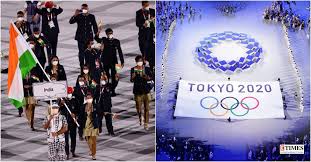. Originally scheduled for July 24 to August 9, 2020, the games were postponed to 2021 due to the COVID-19 pandemic, marking the first time in Olympic history that the event was rescheduled rather than canceled. The Olympics eventually took place from July 23 to August 8, 2021, but the event retained the “Tokyo 2020” branding.
Table of Contents
Context and Challenges

The 2020 Tokyo Olympics were highly anticipated, with Japan preparing to host the event for the second time, having first hosted the Summer Olympics in 1964. However, the global outbreak of COVID-19 in early 2020 created unprecedented challenges for the International Olympic Committee (IOC), the Tokyo Organizing Committee, and athletes around the world.
The decision to postpone the Olympics was made in March 2020 after extensive discussions between the IOC, the Tokyo Organizing Committee, and other stakeholders. The postponement was a massive logistical challenge, affecting everything from the athletes’ training schedules to the availability of venues, accommodations, and broadcasting rights. Despite the challenges, the decision was widely supported as a necessary step to ensure the safety of athletes, officials, and spectators.
Health and Safety Protocols
Given the ongoing pandemic, the Tokyo 2020 Olympics were held under strict health and safety protocols. For the first time in Olympic history, most events took place without spectators. This decision was made to minimize the risk of COVID-19 transmission, although it significantly altered the atmosphere of the games. Athletes were required to undergo regular testing, and strict measures were in place to maintain social distancing and hygiene within the Olympic Village and competition venues.
The absence of spectators led to a quieter, more subdued Olympics, but it also allowed for a unique focus on the athletes and their performances. The global audience tuned in through television and digital platforms, making the Tokyo 2020 Olympics one of the most-watched sporting events in history.
Highlights and Key Moments
Despite the challenges, the Tokyo 2020 Olympics delivered memorable moments and outstanding performances across various sports.
1. Opening Ceremony
The opening ceremony, held at the National Stadium in Tokyo, was a poignant affair, reflecting the global struggle against the pandemic. With limited attendance, the ceremony focused on themes of resilience, hope, and unity. The parade of nations was notably smaller, with many delegations sending only a few representatives to minimize the number of people present.
2. New Sports and Events
Tokyo 2020 saw the introduction of several new sports and events, including skateboarding, surfing, sport climbing, and karate. These additions were part of the IOC’s effort to modernize the Olympics and attract a younger audience. The inclusion of these sports added a fresh dynamic to the games and provided new opportunities for athletes to showcase their talents on the world stage.
3. Simone Biles and Mental Health Awareness
One of the most significant stories of the Tokyo 2020 Olympics was Simone Biles, the American gymnast widely regarded as one of the greatest of all time. Biles withdrew from several events citing mental health concerns, a decision that sparked widespread discussion about the pressures faced by elite athletes. Her decision to prioritize her mental well-being over competition was praised by many and brought greater awareness to the importance of mental health in sports.
4. Record-Breaking Performances
Despite the unusual circumstances, several athletes delivered record-breaking performances. American swimmer Caeleb Dressel won five gold medals, dominating in the pool and cementing his status as one of the stars of the games. On the track, Elaine Thompson-Herah of Jamaica became the first woman to win the 100m-200m double at consecutive Olympics, following her victories in both events at Rio 2016.
In athletics, Norway’s Karsten Warholm set a new world record in the men’s 400m hurdles, running a time of 45.94 seconds and breaking his own previous record. This performance was widely regarded as one of the greatest in Olympic history.
5. Team Sports and Unity
The team sports competitions provided some of the most dramatic and emotional moments of the games. In basketball, the United States men’s and women’s teams continued their dominance, with both teams winning gold. The U.S. women’s team, led by legends like Sue Bird and Diana Taurasi, secured their seventh consecutive Olympic gold medal.
In football, Canada won the women’s tournament, defeating Sweden in a tense penalty shootout. This victory marked Canada’s first Olympic gold in women’s football and was celebrated as a historic achievement for the team.
Global Impact and Legacy
The Tokyo 2020 Olympics, despite the challenges posed by the pandemic, were a testament to the resilience and determination of the global sporting community. The games provided a much-needed moment of unity and celebration during a time of global uncertainty. Athletes from around the world came together to compete at the highest level, showcasing the enduring power of sport to inspire and bring people together.
The Tokyo Olympics also had a significant impact on the host city and country. Japan invested heavily in infrastructure and technology to deliver a successful games, and while the absence of international spectators was a significant economic setback, the long-term benefits of improved infrastructure and global exposure are expected to contribute to Japan’s future growth.
Indianfastearning.comOlympics: Indian Men’s Hockey Team Wins Bronze, Creates History With Back-To-Back Podium Finishes wonder full 2024
Conclusion
The Tokyo 2020 Olympics were unlike any other in history, marked by the challenges of the COVID-19 pandemic and the adaptations necessary to ensure the safety of all participants. Despite these challenges, the games succeeded in delivering memorable moments, record-breaking performances, and a powerful message of resilience and unity.







